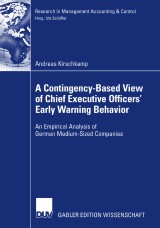Details

A Contingency-Based View of Chief Executive Officers' Early Warning Behaviour
An Empirical Analysis of German Medium-Sized CompaniesResearch in Management Accounting & Control
|
53,49 € |
|
| Verlag: | Deutscher Universitätsverlag |
| Format: | |
| Veröffentl.: | 23.01.2008 |
| ISBN/EAN: | 9783835055049 |
| Sprache: | englisch |
| Anzahl Seiten: | 271 |
Dieses eBook enthält ein Wasserzeichen.
Beschreibungen
Foreword With early warning of CEOs in small and medium-sized companies, Andreas Kirschkamp has found a highly relevant and, up to this point, mainly unexplored research area as a field for his dissertation thesis. In a first step, he confirms the results of traditional contingency theory which show a strong link between environmental uncertainty and strategic sensemaking. In a second step and as the actual core of this study, he elaborates on the link between personality traits of CEOs and their strategic sensemaking. Thus, he sees his study in the tradition of an “extended contingency theory”. The underlying framework originates from Lewin/Stephens 1994 who distinguish eight attitudes as determinants of organizational design. Kirschkamp empirically shows that six of these attitudes have significant explanatory influence on the design variables. However, egalitarianism and degree of moral reasoning do not have any explanatory power within this context. Regarding the relationship between early warning behavior and success, Kirschkamp finds that successful CEOs differ in their use of sources from their less successful peers. They use internal, impersonal and external, personal sources more than managers of organizations with low success in early warning do. The managers with effective early warning behavior scan with a broader scope, delegate less, interpret with more and different partners, and more intensively. However, no difference can be observed as for the frequency of scanning, tool support and fixity of time for interpretation.
Understanding of Early Warning in Literature and Definition of Important Terms.- Contingency Theory as an Approach to Explain Early Warning Behavior.- Deduction of Hypotheses.- Operationalization of the Research Model.- Methodological Conception of the Analysis.- Results of the Empirical Analysis.- Final Thoughts and Outlook.
Dr. Andreas Kirschkamp promovierte bei Prof. Dr. Utz Schäffer am Lehrstuhl für Controlling der European Business School, Oestrich-Winkel. Er ist im Bereich Mergers & Acquisitions bei der Verlagsgruppe Georg von Holtzbrinck in Stuttgart tätig.
Organizations need to identify risks and chances of environmental changes in order to adapt to or possibly even to influence them. Early warning which comprises scanning and interpretation plays an important role in this process. Whereas the traditional contingency approach considers early warning as a part of the organizational structure, the extended contingency theory assumes the additional influence of an individual’s personality on early warning. <br>
<br>
Andreas Kirschkamp empirically analyses the early warning behavior of Chief Executive Officers in German medium-sized companies. First, he presents the design variables of early warning, then the influencing contingency variables. On the basis of the scholarly research on psychological and contingency theory, the author deduces hypotheses and tests them. The results show that early warning behavior is not only influenced by traditional contingency variables but also by personal attitudes. Therefore, the author proposes combining the extended contingency theory with the traditional contingency theory.<br>
<br>
Andreas Kirschkamp empirically analyses the early warning behavior of Chief Executive Officers in German medium-sized companies. First, he presents the design variables of early warning, then the influencing contingency variables. On the basis of the scholarly research on psychological and contingency theory, the author deduces hypotheses and tests them. The results show that early warning behavior is not only influenced by traditional contingency variables but also by personal attitudes. Therefore, the author proposes combining the extended contingency theory with the traditional contingency theory.<br>
Organizations need to identify risks and chances of environmental changes in order to adapt to or possibly even to influence them. Early warning which comprises scanning and interpretation plays an important role in this process. Whereas the traditional contingency approach considers early warning as a part of the organizational structure, the extended contingency theory assumes the additional influence of an individual’s personality on early warning. <br>
<br>
Andreas Kirschkamp empirically analyses the early warning behavior of Chief Executive Officers in German medium-sized companies. First, he presents the design variables of early warning, then the influencing contingency variables. On the basis of the scholarly research on psychological and contingency theory, the author deduces hypotheses and tests them. The results show that early warning behavior is not only influenced by traditional contingency variables but also by personal attitudes. Therefore, the author proposes combining the extended contingency theory with the traditional contingency theory.<br>
<br>
Andreas Kirschkamp empirically analyses the early warning behavior of Chief Executive Officers in German medium-sized companies. First, he presents the design variables of early warning, then the influencing contingency variables. On the basis of the scholarly research on psychological and contingency theory, the author deduces hypotheses and tests them. The results show that early warning behavior is not only influenced by traditional contingency variables but also by personal attitudes. Therefore, the author proposes combining the extended contingency theory with the traditional contingency theory.<br>
Diese Produkte könnten Sie auch interessieren:

Change Management in Zeiten des Wandels. Homeoffice und die Rolle der Kommunikation

von: GRIN Verlag (Hrsg.), Sarah Höttges, Hanin Chehab, Olivia Gibiec, Dieu Linh Hoang

29,99 €















